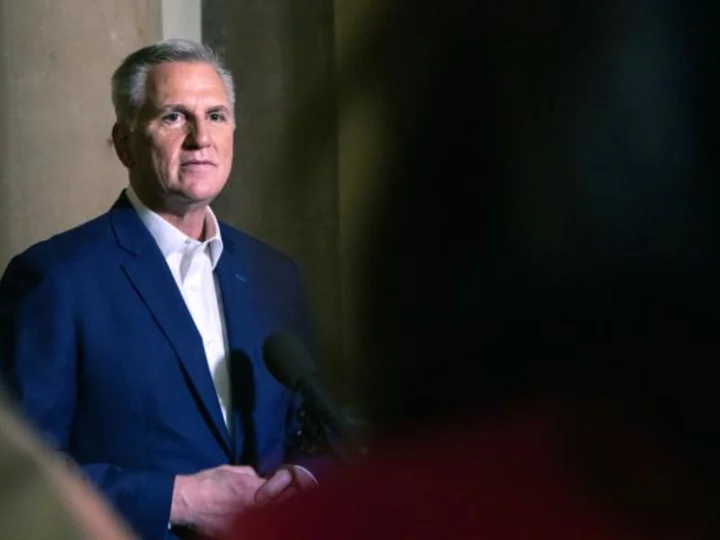House GOP leaders are furiously working behind the scenes to build Republican support for a critical national defense bill as a band of hardline conservatives continue to make demands that could threaten its chances for passage despite already having gotten GOP leaders to cave and allow votes on hot-button amendments.
Conservatives are still unhappy because they wanted some of the controversial provisions they have pushed for to be automatically included in the underlying bill. Now, those hardliners are demanding that GOP leadership whip support for those amendments to try to ensure that they pass, according to multiple sources, and the hardliners have indicated they won't support the final bill otherwise.
The problem for House GOP leaders is that the more concessions they grant to conservatives, the more defections they risk on a final vote on the bill -- the National Defense Authorization Act -- from moderate Republicans and Democrats, whose votes they may need to secure passage.
GOP leaders already made a concession to conservatives by setting up a series of votes on contentious amendments ranging from rescinding the Pentagon's policy of reimbursing travel for individuals who seek abortions out of state to barring Department of Defense health coverage from covering the cost of gender affirming health care.
But that has not been enough to satisfy the conservative hardliners.
House GOP Whip Tom Emmer, a Minnesota congressman, was seen in animated conversations with some of the hardliners on the House floor as they initially withheld support for a procedural vote on the bill earlier on Thursday, with Emmer asking what they needed in exchange for their support, according to a member who witnessed the interactions.
Texas GOP Rep. Chip Roy said there better be some "damn good whipping" for those amendments in order for him to support the final bill. When asked by CNN whether leadership gave him those commitments, Roy said yes, but declined to name which one.
Another GOP lawmaker said the amendments they want leaders to whip are related to Ukraine funding, the Pentagon's abortion travel policy and health care for transgender troops.
Freedom Caucus member Bob Good, a Virginia Republican and one of the members that initially held his vote on the rule, said he will not vote for final NDAA passage unless the chamber passes some of the more conservative amendments, including "the amendment banning funding of abortion or transgender surgeries."
"No way will I vote for the final bill if we don't pass those amendments," Good told CNN.
House Speaker Kevin McCarthy, downplayed the House floor chaos, saying, "I don't think it was drama."
"They held their votes and then they voted for it. There was nothing new," he insisted.
GOP Rep. Ralph Norman of South Carolina said various members had a series of issues they wanted addressed as House Freedom Caucus members waited to vote to pass the rule. He said Rep. Andrew Clyde of Georgia was unhappy some of his amendments were not included and others wanted their amendments to be self-executing.
Other Republicans from swing districts warned the abortion issue shouldn't be a part of the NDAA debate.
"I just think it doesn't need to be in there. This is a bill to make sure our armed forces have what they need to protect this country and our allies. We don't need to be talking about abortion," Republican Rep. Anthony D'Esposito of New York said.
Rep. Nick LaLota, also a New York Republican, told CNN he had not made up his mind about whether he could support a rollback of the Pentagon's reimbursement policy, but warned the issues didn't belong in the NDAA.
LaLota argued the point of the NDAA was ensuring the US had a strong military against countries like China. "Some of these amendments are distractions from that," he said. "If these are going to be policy issues ... they should be done outside the NDAA."
McCarthy has defended his strategy of allowing controversial amendments put forward by the right flank, telling CNN's Manu Raju that members "actually have a voice with what the bill will look like at the very end. It doesn't predetermine what will be in the bill."
But Democrats are expected to peel off in droves from backing the underlying bill if the abortion amendment is adopted as part of the NDAA, something that could put vulnerable members in a position of having to defend back home why they ultimately didn't back a Pentagon policy bill that includes pay raises for members of the military and future investments in military infrastructure.
"It's not ideal. I always support the NDAA," one Democrat said on the condition of background to speak freely about their political predicament. "It sucks, but I have to make a decision. That's what I am weighing. I have to figure it out. Republicans are making the NDAA a culture war bill, but at the same time I've always voted for pay raises so this is a challenge."
Rep. Katherine Clark, the House Democratic whip, warned Republicans there won't be any Democratic support if the House adopts a GOP amendment to strike down the Pentagon's abortion policy -- potentially sinking the bill authorizing defense and national security programs.
"What we're seeing now, the GOP once again choosing extremism, making abortion and women's health care and freedom in this country the issue that they put over our national security. So we'll see how this plays out and what amendments are taken up but I don't see Democrats supporting an NDAA with that in it," Clark told Raju.
This story and headline have been updated to reflect additional developments.

